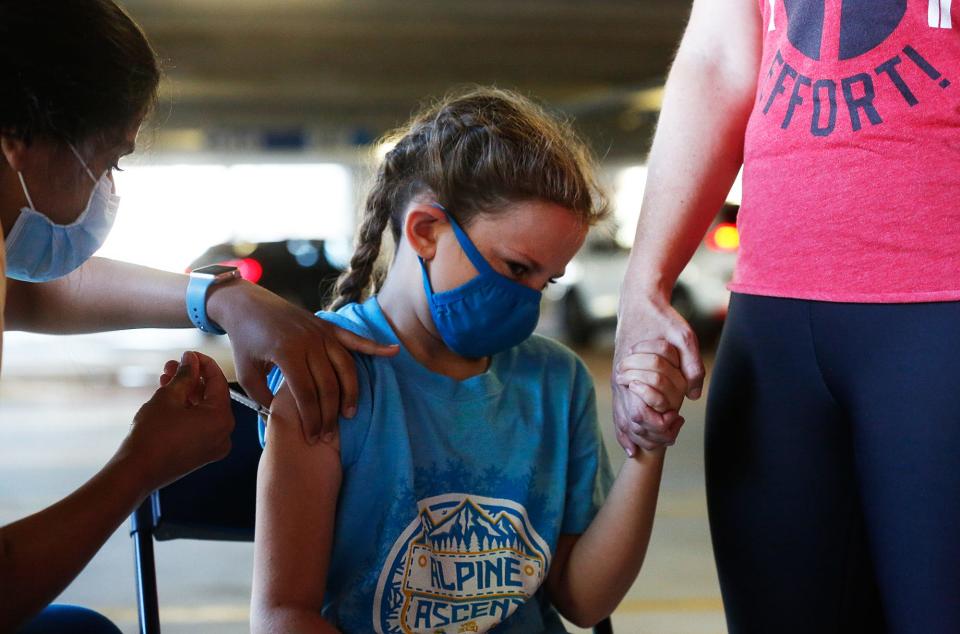Parenting Now: Preparing your child for vaccinations, COVID or otherwise
To provide our community with important public safety information, The Register-Guard is making this daily update related to the coronavirus free to read. To support important local journalism like this, please consider becoming a digital subscriber.
As a parent, it’s never easy seeing your child fret over getting a shot or feeling pain from it, but there are things you can do to help prepare your child for their COVID-19 vaccination or any other shots as part of a wellness checkup.
“It’s not uncommon for kids to be anxious about getting a vaccination,” pediatrician Dr. Pilar Bradshaw said and advised parents to treat the COVID-19 vaccine like you would any other vaccination.
Many parents wonder whether it is better to talk about shots ahead of time or to “spring” it on them. Dr. Bradshaw encourages parents to prepare their child for their vaccination rather than “Surprise, you’re getting a shot!”
Related: CDC makes vaccine boosters available for all adults
Dr. Anita Geisler, pediatrician and Parenting Now board president, agrees.
“As you prepare for your wellness checks, remember to be kind but firm to your child so they can calmly anticipate their upcoming vaccinations.”
“Remember, kids pick up on how the adults around them are feeling, so if you are calm before and during the vaccination, your child will likely be calmer as well,” said Bradshaw, who suggested parents be reassuring and explain that it will pinch for just a second and then it will be over.

"For older kids who understand the importance of taking safety precautions against COVID, give them huge kudos for getting the vaccine,” Bradshaw said. “Remind them that in doing so, they are helping to protect not just themselves but their family and others in the community.
"Explain that the shot will also make it safer for them to participate safely in fun activities with other kids, and being vaccinated means they don't need to quarantine should you later discover that they were in close contact with someone who tests positive for coronavirus.”
Ideas for making shots feel less scary
Meredith Tufts, program manager and parenting educator at Parenting Now, advises that parents consider their child’s temperament and age when it comes to conversations about getting shots.
“Some children will have an easier time with lots of warning and conversation. For others, it builds their stress and fear around it,” Tufts said.
She suggests parents ask themselves:
How does my child handle the unexpected?
Do they tend to feel a lot of anxiety about future events?
For those conversations, Tufts suggests keeping them “true” and brief, and focusing on the beneficial aspects of getting vaccinations. Sample language could include: “We get vaccines to help our bodies know how to keep us healthy/fight germs."
Children learn by doing and repetition.
Many young children like practicing giving shots, Tufts said.
For local stories that matter, subscribe today.
You could use an empty infant's medicine dispenser, a straw or anything long and narrow to give “shots” to a stuffed animal, baby doll or caregiver. By turning it into a game, you can model the words and behaviors you want your child to learn, as well as teach them new skills, name emotions they might feel during a shot and problem-solve solutions to when they feel scared or worried.
If your child enjoys watching videos, there are several programs for kids that talk about vaccines, germs and getting shots, including Sid the Science Kid: “Getting a Shot: You Can Do It!” Kindergarteners might also enjoy a Daniel Tiger video titled: “Daniel Gets a Shot.”
Some children’s nerves can be calmed by knowing that a special activity or treat will come after their shots. With your child, decide on something your child could get as a reward or celebration for “being brave.” This could be a trip to the park, an ice cream or special toy.
During your child’s appointment
Geisler recommends putting your phone away during your child’s vaccinations and wellness checkups.
“Though your child may seem too young to notice that you are on a device, he/she does on some level recognize that your attention is divided.”
If your child starts to get nervous or anxious, Heather Gray, program manager and parenting educator at Parenting Now, recommends using the NBA Stress Busters approach from Parenting Now’s Make Parenting a Pleasure curriculum.
Notice — physical symptoms, thoughts, and feelings
Breathe — three deep breaths through nose
Act — step back and count to 10, add humor, get moving (wiggle your arms, have a quick dance party, do five jumping jacks)
For older children, Bradshaw encourages parents to let older kids know that if they have questions or concerns about the COVID vaccine, they can talk with their doctor about it before they get the shot.
Geisler concludes: “If you are worried that your child won’t do well (during their shots), let your doctor know ahead of time — they and their staff are very skilled at helping through this scary part of the check up.”
Parenting Now is a nonprofit offering groups and workshops so that all children are raised by nurturing, skilled parents. Contact Parenting Now at parentingnow.org, on social media and at 541-484-5316.
This article originally appeared on Register-Guard: Parenting Now: Tips to prepare child for vaccinations, COVID
